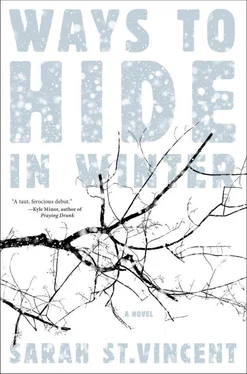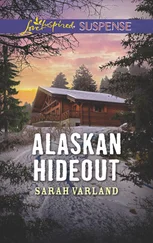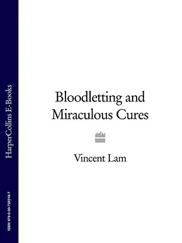Then there was a gap, a long, empty stretch where a pair of ruts led down to one of the lakes. It appeared and was gone just as quickly, flickering by on my right. Slowing, I found myself looking back at it in my rearview mirror.
Before I knew it, I had pulled over.
There were two lakes in the park, Laurel and Fuller, both of which stood where the quarries had once been. When I was a child, bits of blue and green slag from the old iron smelter had still washed up on the sand that had been trucked in. My brother and I would walk along the shore and collect them, along with pebbles and snail shells and shining fragments of charcoal. Laurel was the shallower of the two and was always crowded in summer—small children with their mothers, Boy Scouts, softball teams, fishermen. Laurel had pavilions and grills, fire pits. When I’d gotten married, we’d had the reception there, outdoors, under the sun. Surrounded by hordes of happy, frolicking strangers.
Fuller was something different: smaller, deeper, darker, encircled by pines. Fuller was where, when I was sixteen, I would lie on the sand late at night, long after the park had closed, and look up at the stars in their endless, stoic expanse. Where I brought friends, the ones who could stand the silence. Sometimes, coyotes would bay, or a small nocturnal animal would crash through the brush, but otherwise nothing stirred. By day, it was just as still. Few people swam at Fuller. It was too isolated, too chilly, too overwhelming in its indifference, its unchanging beauty.
Grabbing my book, I tramped through the woods to Fuller, drawing my coat around me and following the slight downward slope until I could see a clearing through the trees. A few more steps and there it was: the great, pale expanse of the lake, ice streaked with snow that glittered under the empty sky. A ring of pines surrounded the void like sentries, stretching back over the mountain, dark and imposing, keeping watch.
A pair of picnic tables stood near the shore, and I walked over to them. With a gloved hand, I brushed the snow off one of the benches and sat, opening the novel I was carrying. The pines stretched overhead, seeming to bend and converge at their tips.
The wind stirred the pages, tugging them from my fingers. I put the book aside restlessly and rose, stepping closer to the lake that seemed to draw me toward it, its very blankness beckoning to me. How thick was the ice? I’d never seen anyone skating here, but that didn’t necessarily mean anything. Most people, aside from the hunters, wouldn’t care to risk the steep curves the road made as it wound its way up the side of the mountain. Not in December.
Edging up to the shoreline, I touched the ice with a foot, and something tightened in my chest.
It didn’t matter what people thought they saw when they looked at me. I didn’t limp.
I let out a breath. The cold air was sharp in my lungs, making me feel even more alert than usual to every movement around me, every sound.
Tentatively, I slid my foot all the way onto the ice, then took a step. The surface was firm beneath me, seeming to push back against my heels. The breeze reached through my clothes, and I shivered, feeling something inside me twist, like hard, dead vines being wrung tight.
I didn’t limp. I didn’t.
I took a second step, elbows pressed against my sides. There was a low sound as snow yielded under me, crushed into footprints. Otherwise, the world remained devoid of noise.
I looked out over the gray plain that stretched around me. Our wedding, mine and Amos’s, had been held in a chapel on this mountain, St. Eleanor Regina—a falling-down clapboard place in a clearing, one with a handful of windows to let in the sunlight, a priest who came through once every couple of weeks.
It was what I had wanted.
I scuffed a foot against the surface. The twisting feeling grew tighter, as if something within me would rub together too hard and spark.
I stood still.
Then suddenly I was marching forward, half-running, feet pounding against the ice. My breath came quickly as I lifted my boots, one after the other, traces of snow scattering behind me. The hot, clenched feeling burned inside me, pressing against my heart and making me stumble. I banged my knee against the surface, hard, and gasped but pushed on. Slipping and scrambling, I went out fifty feet from shore, then a hundred, then two hundred, farther and farther.
Before I knew it, I had reached the center of the lake.
I came to a stop, panting. The ice stretched out around me, wide and smooth, a hundred yards or more to each point of the shore.
The cold had brought tears to my eyes, and I wiped them roughly with the back of my hand, legs trembling, pretending not to feel my hip burning and my shoulder throbbing where the pins had been put in. Steam rose from my mouth as I breathed.
When I shifted my foot, the ice creaked, sending a jolt through my nerves. I moved quickly to what felt like a thicker patch and crossed my arms over my chest, listening to the rush of my breath.
The space before me was deserted, as quiet and stark as the surface of the moon. Tipping my head back, I gazed up at the sky and the dark, ragged points of the treetops.
Sweat coated my temples and the back of my neck, and I could feel my pulse thudding. Feeling both sick and exhilarated, I let myself drop onto a thin layer of snow, sitting back and letting it soak through my jeans.
I would never know why I did these things, not really. Most of the time, for the past four years, I had felt as though I were enveloped in a haze of fear, a low sense of terror that hummed and crackled in the background, making me flinch when I lit the gas stove, when I drove in the rain, when I mounted the ladder to fix the gutter. And yet, every so often, I flung myself into danger as if it were the only thing I wanted, as if I could only be alive in moments as swift and violent as the one that had frightened me the most.
When the surface beneath me remained solid, I gradually began to relax, realizing I’d been holding my breath. After a few minutes, I unfolded backward, lying down to look up at the sky.
Okay, I thought, waiting for my racing heart to slow.
The mountain, I could guess, had never been a welcoming place to live, plagued as it was with blizzards in the winter, damp heat and clouds of mosquitoes in the summer. No doubt my great-grandfather had suffered here when he was mining, and the prisoners who had later been held in the camp down the road probably hadn’t had an easy time of it, either. Although, I thought as I rested there, maybe it was just the same where they’d come from. They were long gone anyway, the prisoners, and nobody thought about them much anymore. Hidden in life and almost as hidden in death, remembered only by a few retirees who had time on their hands and saw fit to look into these things, driving up on sunny days to pester the park rangers with questions—uselessly, I thought, since the rangers didn’t seem to know any more about it than anyone else did.
I picked up a handful of snow, squeezing it, letting it crumble in my fingers.
There were times when the days seemed to slip away so quickly, one after the other, like paper boats going over a waterfall, until one morning—this morning—I had found myself waking in the cold at my grandmother’s, twenty-seven, alone, body curled tightly under the sheets like some hibernating thing. I didn’t know how it had happened, how I had gotten to be this old, the years falling through my hands before I could catch them. Standing undressed in front of the mirror before I got into the shower, I almost hadn’t known who I was, my face sharp with cares, my limbs shivering, wrapping my arms around myself to keep warm.
She never was able to light the woodstove properly, my grandmother.
Читать дальше












